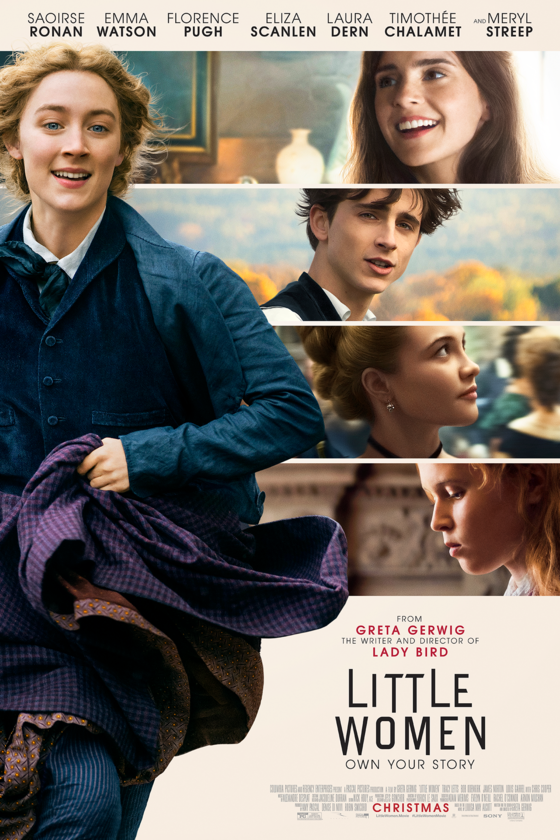Little Women
Little Women, 2019, 2 ¼ stars
Little Women reworked
Greta Gerwig gambles with story’s timeline, structure
Exclusive to MeierMovies, December 14, 2019
The first film adaptation of Louisa May Alcott’s Little Women hit the big screen (the only screen at the time) in 1917, less than 50 years after the novel was written. Now, 102 years later, the book is getting its eighth cinematic adaptation. Is eight enough? That depends on your familiarity with the older movies and your own storytelling preferences. For me, it’s too much.
Despite a never-aging story, it’s difficult to make every movie version seem unique and necessary, especially because the sixth (and best) version, from 1994, is still relatively fresh in our minds. That’s the one with Susan Sarandon as the mother, and Winona Ryder, Claire Danes, Trini Alvarado and Kirsten Dunst (and Samantha Mathis as the elder version) as the daughters. Noteworthy for Ryder’s endearing but surprisingly non-tomboyish interpretation of Jo and a stunning turn by Danes as the doomed Beth, that version is the most narratively satisfying rendition of the domestic and romantic escapades of the March family, in Massachusetts, in the years during and immediately following the Civil War. Directed by Gillian Armstrong, it’s also memorable for solid performances by Christian Bale (as next-door neighbor and love interest, Laurie) and Gabriel Byrne (as Jo’s German beau, Friedrich Bhaer).
Gerwig apparently thought she had to do something revolutionary to top that version. Perhaps taking inspiration from Joe Wright and his brilliant reworking of Anna Karenina in 2012, she took an enormous gamble by completely altering the story’s structure. Instead of following a traditional timeline, she incessantly cuts back and forth between part one (set during the Civil War) and part two (three or four years later). Eschewing linear storytelling and character continuity, she instead organizes the narrative by theme, mood and other unpredictable elements, an increasingly prevalent crutch of 21st-century filmmakers.
It’s a noble but misguided effort, as the muddled story never congeals. Further, thanks to the frenetic and odd juxtaposition of vignettes, we’re robbed of our chance to truly understand the lives of the March sisters and experience the natural progression of their triumphs and tragedies. The character of Beth gets particularly lost, as do the otherwise effective performances of Saorise Ronan as Jo, Emma Watson as Meg and Florence Pugh as Amy. Further, the characters of Laurie and Frederick are poorly conceived and forgettably portrayed, which is surprising considering the former is played by Timothée Chalamet. And Laura Dern, as the mother, is far more memorable in this year’s Marriage Story, while Meryl Streep, as aunt March, is mostly wasted. (Edna May Oliver, from the 1933 version directed by George Cukor and starring Katherine Hepburn, is still the best in that part.)
Gerwig arguably lends her film more style and panache than previous adaptations, not to mention an interesting feminist, metatheatrical ending. But the film contains less heart and significantly less clarity than the 1994 film (3 ½ stars), the classic but flawed 1933 version (2 ¼ stars), and the sweet and impeccably crafted 1949 retelling (3 ¼ stars) directed by Mervin LeRoy and starring June Allyson, Elizabeth Taylor, Janet Leigh and Peter Lawford. The good news is Gerwig’s version has been far better received than the one from last year that transplanted the Marches to the modern world. It proves that time has been kind to Alcott’s story, even if Gerwig’s script hasn’t.
I direct my final comment not to Gerwig or those involved with the production — as their intentions and efforts are genuine — but to the media and the movie’s marketing division. By labeling the film as a long-overdue feminist interpretation, they are insulting all the women — and men — involved in previous productions while cynically taking advantage of our current social climate. Truth is, Little Women was a feminist piece of art in 1994 (when it was also directed by a woman), in 1949, in 1933 and way back in the 1860s.
© 2019 MeierMovies, LLC
For more information on the new movie, visit IMDB and Wikipedia.
